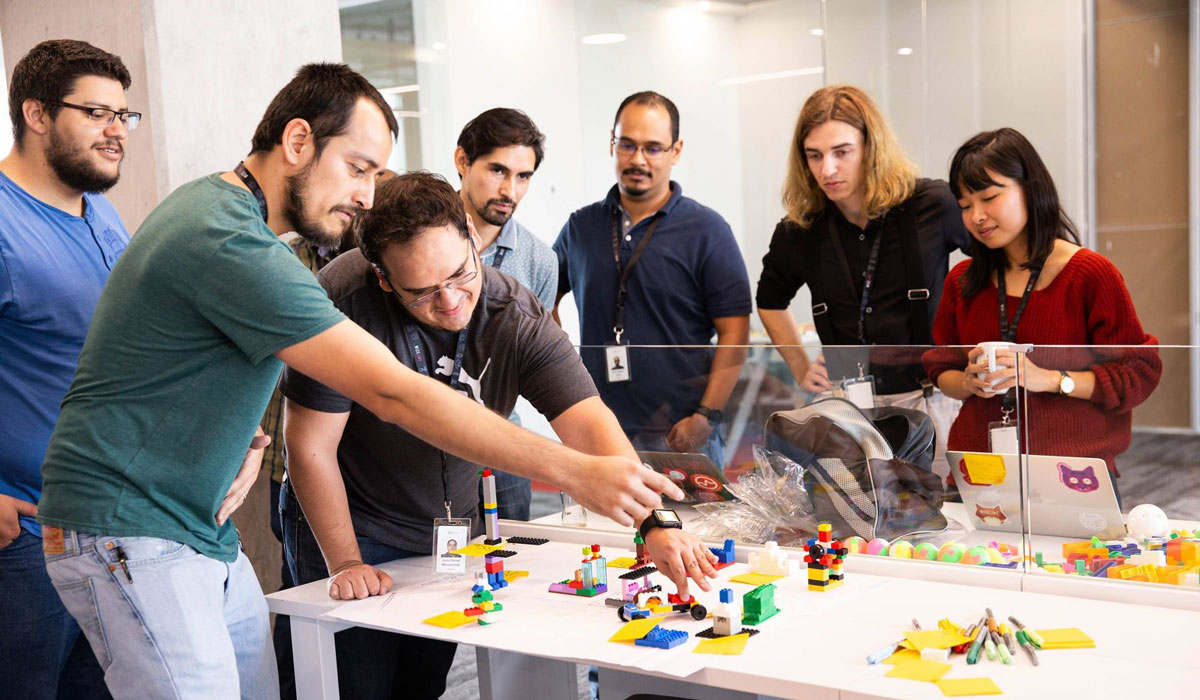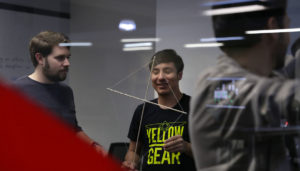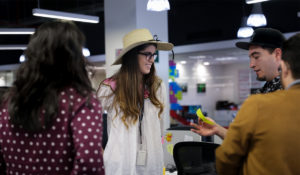Wizeline conducts a number of workshops both for clients and internally. We’ve found that a well-executed workshop can bring clarity, consensus, and inspiration. “When we first chat with a client, they don’t know what they want to build or how to approach a problem,” says Wendy Johansson, VP of UX and Wizeline Academy. “We come in and help them discover where the gaps are.”
What is a Wizeline workshop?
Workshops run by Wizeline leverage design thinking, a process popularized by Stanford University, international design firm IDEO, and Google to stimulate innovation. Design thinking methods combine engineering, design, and business needs for impactful solutions. Our team leads focused sessions and facilitate activities that foster strategic prioritization of ideas from the people who understand your company best—your own team.
Workshops are typically one day, three-day, or five-day sprints, ranging from extremely focused sessions to a full design sprint with prototyping and user testing. Wizeline prides itself on created highly-modular and customized workshops.
Our workshop clients come to us because they want to:
- Align their team around company goals
- Define success for the team and how to measure it
- Build empathy across all the teams who work on a project
- Understand their users and customers
- Determine Minimum Viable Product (MVP) and more
Building blocks
When a client signs on, we have a kickoff call to ensure we agree on the plan for the workshop. The UX lead work with the client to understand the needs and determine which of the workshop types is most applicable—product discovery, ideation, data, or bots. They discuss logistics, communicating best practices, scheduled breaks, and the best environment for a successful workshop.
Who should attend? The more diverse the group the better. Different perspectives lead to better outcomes. When we come in and work with a product or business team, we stress the importance of including technical stakeholders. When user story mapping, for example, it helps to have a technical perspective. We strive to build empathy between the cross-functional teams that work on a single product.
This is especially important when defining goals. We have the group collectively define the success of the product and determine the proper KPIs. Usually, there’s a lot of variance between stakeholders and half the fun is helping everyone align.
We worked with a client in Thailand who was building a mobile app for financial tech. The workshop included several stakeholders, each with their own priorities. The business owners were concerned with hitting deadlines. The product team only cared about monthly active users. The engineers were thinking about uptime and security. Then the CTO comes in and says “Well, we need to stay within this budget” and suddenly, priorities change. It’s valuable to reconcile goals and metrics across the board. While everyone might arrive with their own agenda, they leave with a more holistic perspective.
When should you host a workshop?
Companies should host workshops regularly, especially when there’s a new product or new team members. Wizeline conducts workshops internally to define new processes. We worked with our People Ops team to create customer experience maps for the Wizeline employee journey. At what stage of the journey do employees want to be promoted? How can we improve the candidate experience?
Workshops have also been integral in managing the way we build client teams. The staffing team needs to place the right person on a project in the shortest amount of time. Our workshop helped us understand the pain points, engineers’ concerns, and helped us determine how we can automate the process. When undergoing a reorganization, we used a workshop to identify what role the company was missing. As a result, we now have a team of stellar delivery managers.
What you’ll take home
Each workshop is different, and therefore the outcome of each is different. Often, our most valuable deliverable is improving the dynamics of a team. Corraling all of the different stakeholders in a room and walking away with clear ideas, goals, and prototypes is invaluable. More tangible deliverables include user story maps, artifacts, details that help a business discover why it should invest in a product.
So, can a workshop save your team? No, but it’s a good start. It is geared toward surfacing problems and finding potential solutions. It will help you remove bias, understand users, and make decisions.
If you’d like more information about how a Wizeline workshop can help your team build better products or simply get on the same page, visit our Workshops page or reach out to consulting@wizeline.com and talk to one of our workshop experts.







